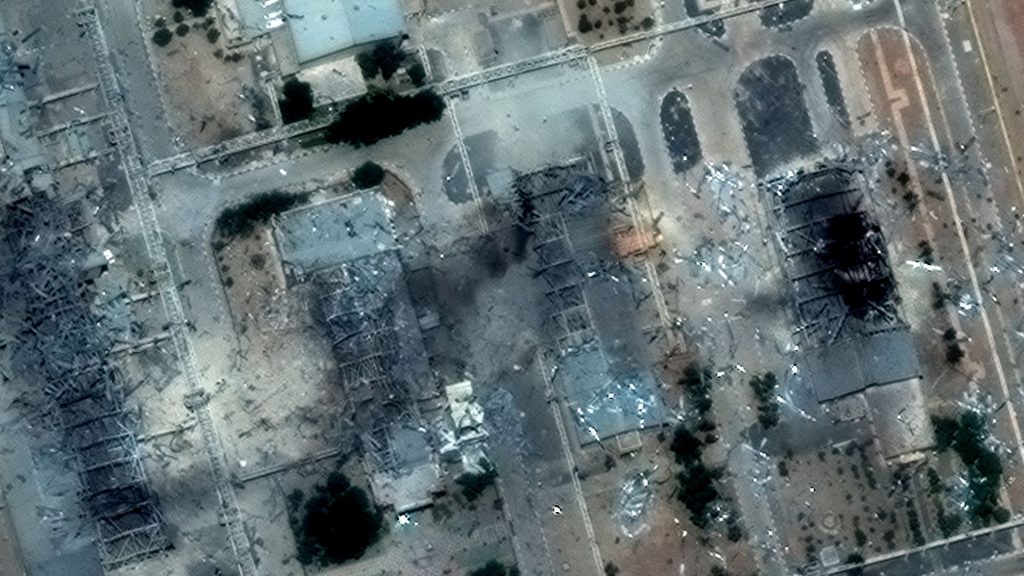Trump hints at regime change as Iran threatens US bases, sleeper cells: Unbiased Updates, June 23, 2025

President Donald Trump labels it a bullseye, while Iran views it as an act of war. The repercussions of a U.S. attack on Iran’s nuclear facilities are significant, particularly with Tehran’s current threats.
Also, gunfire erupted outside a Sunday service, showcasing the swift actions of a church staff member who may have prevented a potential massacre, according to police.
Plus, an individual who was mistakenly deported to El Salvador earlier this year has been returned to the U.S. but now faces smuggling charges. A federal judge has described the government’s case as, at best, tenuous.
These stories and more highlight your Unbiased Updates for Monday, June 23, 2025.
US strikes Iranian nuclear facilities in ‘Operation Midnight Hammer’
The U.S. has entered the fight, striking three of Iran’s key nuclear sites on Saturday, June 21. On his Truth Social platform Sunday night, June 22, President Donald Trump said the strikes caused “monumental damage,” adding, “obliteration is an accurate term!”
Following the attacks, Iran has vowed retaliation.
U.S. officials said more than 125 aircraft participated in “Operation Midnight Hammer,” which included seven B-2 Spirit stealth bombers. Iran indicated that it “reserves all options” — including targeting U.S. bases or closing the Strait of Hormuz, a move that could shake the global economy.

According to NBC News, Iran privately warned Trump before the attack, threatening to unleash sleeper cells inside the U.S. if strikes went forward. Trump has warned of more strikes if Tehran retaliates and has even floated “regime change” writing: “If the current Iranian regime is unable to make Iran great again, why wouldn’t there be a regime change?”
A comment at odds with what top officials have said publicly.
“You don’t have to like the regime. There are a lot of regimes around the world that we don’t like. Okay, but in this particular case, what we are focused on is not the changing of the regime. Okay, that’s up to the Iranian people if they want to do that, but that’s not what we’re focused on,” U.S. Secretary of State Marco Rubio said. “Our national interest is about one thing, and that is Iran not getting anywhere near the capability to weaponize and have nuclear weapons. They’re not gonna get anywhere near that capability.”
Meanwhile, the State Department has issued its first worldwide caution alert in over a year, warning of possible demonstrations against U.S. citizens and interests abroad. The alert makes no mention of this weekend’s strikes, but notes that the broader Israel-Iran conflict has disrupted travel and closed airspace across parts of the Middle East.
Exploring the impacts of the US strike on Iran
As the U.S. awaits Iran’s threatened retaliation, SAN examined more closely the kind of response the U.S. can expect from the Middle Eastern nation. SAN anchor and reporter Ryan Robertson shared some insight on what Americans can expect as the conflict grows across the sea.
SAN Lauren Keenan: Ryan, what are you hearing about what sort of response the U.S. can expect?
SAN Ryan Robertson: Yeah, Lauren, you know, the Strait of Hormuz is kind of the obvious answer that everybody is kind of pointing to the Iranian parliament voted yesterday to move to close that Strait of Hormuz, but it’s actually a, a, The task of the Iranian military to actually do that, the Iranian National Security Council will be the one to actually move on closing that strait.
If that happens, expect oil prices to go up pretty significantly. If oil prices go up, then everything goes up, groceries, all that sort of stuff. About 25% to 30% of the world’s energy and oil flows through the Strait of Hormuz. The United States doesn’t get a bunch of oil from there, but a lot of our friends and allies do. And China also gets a lot of oil from from East Middle Eastern countries.
Cyber hacking could be another issue because the Iranians do have a very sophisticated cyber network, but that’s probably not as expected as closing the Strait of Hormuz.


Keenan: And Ryan, how does the US go about assessing the damage without boots on the ground?
Robertson: Yeah, that’s a great question. and it’s really kind of the, the big question of the day.
Satellite imagery is not going to be enough. Everybody knows that. But the U.S. has access to a wide breadth of, of different intelligence sources. So there’s signal intelligence, monitoring different communications within the Iranian regime.
There’s human intelligence, people on the ground, and we share intelligence with the Israelis. They had Mossad agents operating before the strikes even started. They have Mossad, so the Mossad is like the Israeli spies. They’ve been implanted within the Iranian regime for years, so some spies might actually be, you know, the ones going in by Iran to inspect these sites. We don’t know that yet.
But boots on the ground is going to potentially be the only way to really check that.
Is it going to be American boots? Most likely not. But we could use, you know, boots on the ground in the Iranians and just monitor their signal intelligence, and those sorts of sources to find out exactly how destructive the strikes were.
Israel, Iran continue to trade strikes overnight
Israel has escalated its offensive against Iran, launching a new round of strikes on Tehran and other cities early Monday morning, June 23. The overnight attacks targeted airports, missile launchers and storage sites across Iran.
Israeli officials reported that more than 15 air force jets hit the western city of Kermanshah, destroying surface-to-surface missiles aimed at Israel. The IDF also claims to have struck six airports nationwide, destroying 15 Iranian fighter jets and helicopters.
Meanwhile, missiles fired from Iran have prompted emergency warnings in Israel, urging civilians to stay in protected spaces. Israel’s electricity company stated that the strikes have disrupted power in parts of the south, leaving thousands without electricity.
Security guard kills gunman who opened fire during church service in Michigan
A security guard shot and killed a man suspected of opening fire during church services in Wayne, Michigan, on Sunday, June 22. The Associated Press reported the shooting happened at CrossPointe Community Church just outside of Detroit.
The church’s pastor said a deacon ran the suspect over with his truck, giving the security guard time to shoot him. Police described the suspect as a 31-year-old white male. The pastor told the Detroit News the security guard was shot in the leg.
The gunman, wearing a tactical vest, allegedly opened fire outside the community church just after Sunday service began. Video from inside the church shows the moment the crowd reacted to the reports of a suspected active shooter. The church had just wrapped up an event that was being livestreamed to its YouTube page. The video shows the crowd clapping, some people begin to stand and then shouting is heard offscreen.
People began to panic, running and ducking for cover behind chairs. Outside, the gunman had just started firing. However, before he could get inside, a parishioner hit the shooter with their truck. Two church staff members, including a security guard, returned fire, killing the suspect.
Police said the suspect appeared to be in a mental health crisis, and his motive remained unknown. The FBI is currently aiding in the investigation.
Judge rejects DOJ push to hold deported smuggling suspect
A federal judge has pushed back against the Justice Department, ruling that a man who was mistakenly deported to El Salvador shouldn’t be held in custody while he awaits trial. Kilmar Abrego Garcia was brought back to the U.S. on June 6 to face human smuggling charges. The government argued that he was dangerous and even tied to the street gang MS-13.

The judge said on Sunday, June 22, that there’s no proof Abrego Garcia’s a flight risk or a threat, and criticized prosecutors for relying on shaky evidence and hearsay.
Still, Abrego Garcia will likely remain in immigration custody for now. The case has drawn national attention after the Trump administration deported him despite court orders, igniting a legal and political firestorm.
OKC Thunder beats Indiana Pacers 103-91 to claim city’s first NBA title
The Oklahoma City Thunder are NBA champions, having defeated the Indiana Pacers in Game 7 of the finals. This marks the franchise’s first title since its relocation to Oklahoma City from Seattle in 2008.
Regular season MVP Shai Gilgeous-Alexander led all scorers in the final game with 29 points. Sunday’s Game 7 was a rare event — just the 20th in NBA Finals history.
Indiana held a narrow lead at halftime, 48 to 47, but the Thunder reversed the momentum in the third quarter and ultimately dominated the Pacers 103 to 91 — a fitting conclusion to the best season in OKC’s 17-year history.
Now, basketball fans’ eyes are focused on the NBA draft, scheduled for Wednesday, June 25.





